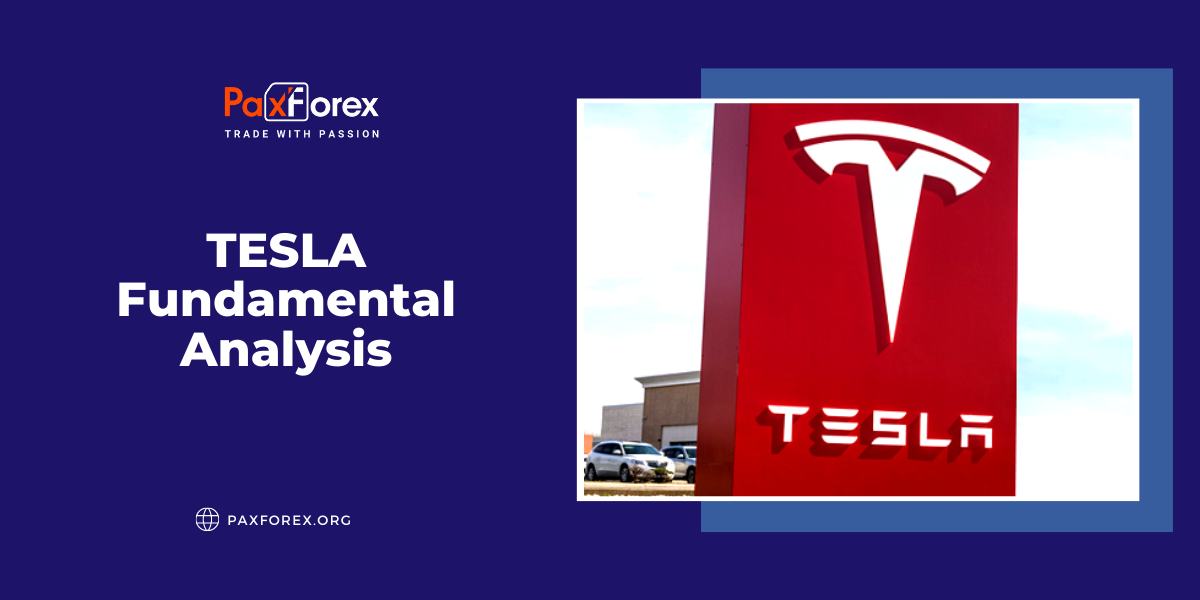
Source: PaxForex Premium Analytics Portal, Fundamental Insight
Tesla is the ultimate example of a company that is constantly struggling on the battlefield. Bulls believe that the company continues to lead the electric vehicle (EV) revolution and develop valuable new product and service categories, while bears tend to think that the hype surrounding the company has led to an overvaluation.
Given that the company's stock price is currently down about 25 percent from its peak valuation, should investors take a closer look at this industry leader? Read on to learn the pros and cons.
Much of the hype about investing in Tesla is that it is an outstanding leader in a sector that is poised for explosive growth. This view has helped some investors justify the stock's extremely high valuation on traditional metrics. The company's price-to-earnings (P/E) ratio is over 100, even with higher analyst earnings estimates for 2022.
But CEO Elon Musk sees the company eventually producing up to 20 million cars a year, up from the 1.5 million expected to be produced this year. That will take some time, however, and the fact that the stock is valued at results expected in such a distant future could be the reason Tesla stock is down nearly 15 percent for the year.
However, the company's growth will not only come from more electric car owners. Musk said that the Tesla Semi truck will start shipping this year and the Cybertruck next year. It is estimated that hundreds of thousands of orders for the Cybertruck have already been placed. Not all of them will be filled, but Musk said Tesla has enough orders for the Cybertruck to cover at least the first three years of production. If the Tesla Semi also gains momentum, these two new products will join the rapidly growing number of vehicle models the company is currently producing.
Investors should also not forget Tesla's energy business. The company is ramping up production of batteries and solar systems, which it sells separately to customers, as well as producing batteries for its electric cars. In its second-quarter report, the company said it continues to ramp up production of Megapack storage units because customer interest "remains high and far exceeds our production numbers." Tesla is also considering taking up lithium recycling to ensure supply chain reliability and cost control.
While Tesla stock may not seem too promising in the short term, investors will likely look at future potential, which could also limit its decline. As long as the new products are successful and the company continues to perform, Tesla should be a good stock for the more aggressive part of the portfolio.
Even after its recent decline, Tesla still has a market capitalization of about $967 billion. This is significantly more than the combined market capitalization of the 15 largest publicly traded competitors in the auto market. At the same time, many of these major competitors are now generating more revenue and net income than Tesla.
Ilon Musk's company continues to show rapid growth, and along with the superior profitability of the business, the impressive growth in sales and profits certainly justifies some level of valuation premium. But how justified will the valuation premium be in the long run? The automotive market is fiercely competitive, and the EV space is becoming increasingly crowded with new models from manufacturers big and small. Tesla is still the clear leader in this area, and its focus on high-end cars may help it maintain higher margins, but competing offerings may begin to reduce the company's pricing power or limit its growth potential in the market.
Tesla is more than a car business. Its battery and energy technology initiatives could generate huge returns, which could help lift its value well above current levels. The company could also generate significant revenue from licensing its autonomous driving technology or other software. On the other hand, Tesla will face stiff competition in these categories, and I think these are somewhat speculative points on which to hang such a high valuation.
When making a decision to buy Tesla stock, investors should compare their assessment of the company's long-term growth potential with its current valuation. Given the company's large market capitalization, its valuation already includes a large number of strong prospects, and the stock could face serious turbulence if volatility continues to shape the broader market. On the other hand, Tesla is the undisputed leader in the electric car market, and it has growth opportunities in other categories that could provide high stock returns over the long term.
As long as the price is above 270.00, follow the recommendations below:
- Time frame: D1
- Recommendation: long position
- Entry point: 286.95
- Take Profit 1: 295.00
- Take Profit 2: 310.00
Alternative scenario:
If the 270.00 level is broken-down, follow the recommendations below:
- Time frame: D1
- Recommendation: short position
- Entry point: 270.00
- Take Profit 1: 265.00
- Take Profit 2: 260.00













